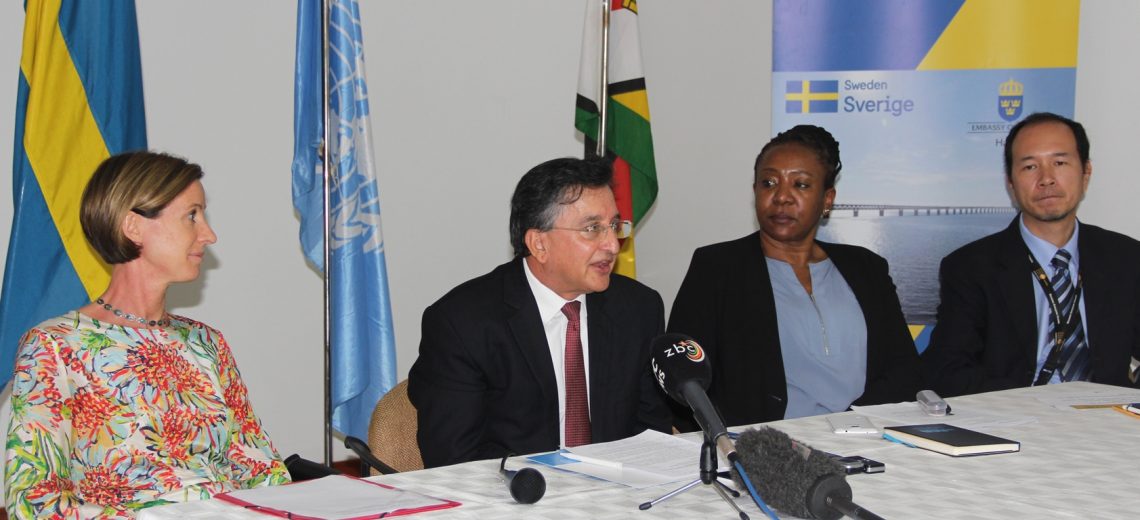By Byron Mutingwende
“In Shona they say “Musha Mukadzi” loosely translated to: The home is the woman. In Ibbo language they say “Nneka” meaning Mother is Supreme. All these narratives and proverbs are meant to debunk the widely held notion that the African culture is predominantly male-chauvinist,” says sociologist John Maramwira.
From 25 November (the International Day for the Elimination of Violence against Women) to 10 December (The Human Rights Day), the 16 Days of Activism against Gender-Based Violence Campaign is a time to galvanise action to end violence against women and girls around the world.
The United Nations Population Fund (UNFPA) on preliminary findings of the 2016 Demographic Health Survey findings noted that while gender-based violence is declining in Zimbabwe, more than one in three women have experienced physical violence since the age of 15 years.
Speaking at the launch of the the 16 Days of Activism Against Gender Based Violence held under the theme, “Leave No One Behind: End Violence Against Women and Girls” that was organised by the United Nations in Zimbabwe in partnership with the Embassy of Sweden in Harare on 23 November 2017, Yu Yu the UNFPA Zimbabwe Deputy Representative said key challenges remain in addressing gender-based violence (GBV).
“According to the 2016 Zimbabwe Demographic Health Survey, there were 300 000 survivers of sexual GBV. Of those only 12 000 sought health assistance while only 3 000 of the victims sought medical assistance within 72 hours.
“Collective efforts are needed from all partners to ensure that survivors of Gender Based Violence have access to essential health services, psychosocial support and legal aid. For survivors of rape or sexual violence accessing medical services within 72 hours is highly critical to prevent pregnancy, HIV infection and Sexually Transmitted infections. It is an emergency as only 1% of the survivors access services and many of them are not aware of its importance,” said Yu Yu.
Sociologist Maramwira said there is need to deconstruct the perception that men and boys are superior to women and girls.
“Charity begins at home. In allocating the chores, parents should not make a distinction between boys and girls. In line manner, both sexes should fetch water, wash their clothes herd cattle or plough the fields. Where money for school fees may be inadequate priority for payment should be based on merit rather than one’s sex. If our children grow up in such environments, in future there will be respect for personal achievement and both gender.
“The education curriculum should encourage the increased women and girls’ uptake of subjects and courses previously reserved for boys and men. Preference should be given to girls and women in order to close the gap,” Maramwira said.
Addressing the media in the capital Harare, UN Resident Coordinator, Bishow Parajuli said, “Some say cases of abuse and violence, especially against women are going up in Zimbabwe, others say that is only because reporting is getting better. It does not matter. There are still many thousands of gender based violence cases reported across the country – and we know that even one case, is one too many and we must end this social ill.”
The United Nations Universal Declaration of Human Rights explicitly states that “Everyone has the right to life, liberty and security of person”. This means that women and men, girls and boys have the right to live, and to live in freedom and safety. Gender Based Violence is therefore a violation of human rights.
Sweden’s Ambassador to Zimbabwe, Her Excellency Sofia Calltorp, said “Investing in people – especially women and children – is an investment for a sustainable socio-economic development – fundamental in every society. For Sweden, protecting women and girls against violence is a key principle in achieving the Sustainable Development Goals”.
Gender based violence is rooted in a social construct of gender that is inculcated at a very early age, and is often built upon unequal power relations and unjust attitudes, leading to violent behaviours. Education and fulfilling employment will show the way. A quality education that deepens knowledge promotes a sense of self and expands life skills, opens the minds of the young to a world of mutual respect, learning and self-worth.
UN Women Country Representative in Zimbabwe, Delphine Serumaga underlined that “to eradicate violence against women and girls and all forms of Gender Based Violence, we must begin to speak differently to act differently.” “In speaking differently, we must continuously remember that women’s and girls’ rights are human rights, therefore we must equate violence against women and girls, and all forms of GBV, as the most pervasive human rights violations for half of the population of Zimbabwe throughout their lived experiences,” added Serumaga.
In Zimbabwe 1 in 3 women face violence throughout their lifetime. Globally, 750 million women were married before age 18, and more than 250 million have undergone Female Genital Mutilation.
There is increasing recognition that violence against women is a major barrier to the fulfilment of human rights, and a direct challenge to women’s inclusion and participation in sustainable development and sustaining peace.






